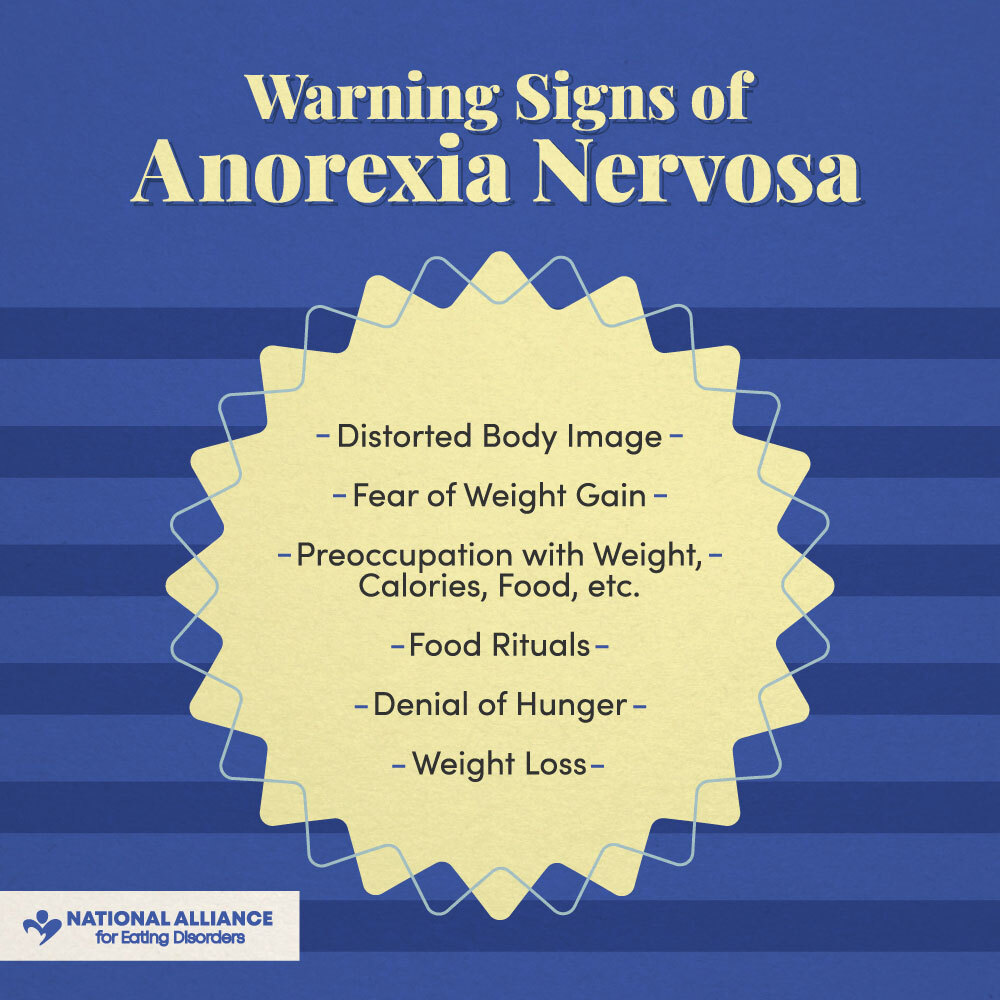What Is Anorexia Nervosa?
Anorexia Nervosa is an eating disorder characterized by the restriction of energy requirements, body image disturbances, and an intense fear of food or gaining weight. Two subtypes of Anorexia Nervosa exist: the restricting subtype and the binge-eating/purging subtype. If you struggle with the restricting subtype, you may maintain low body weight by significantly limiting food intake. Those who experience the binge-eating/purging subtype may restrict their food intake and routinely engage in binge-eating and/or purging behaviors. These behaviors may include self-induced vomiting, compulsive exercise, and abuse of laxatives, diuretics, or enemas.
According to Dr. Thomas Insel, former Director of the National Institute of Mental Health, anorexia nervosa is a “brain disease with severe metabolic effects on the entire body.” Anorexia Nervosa can affect anyone, regardless of their age, gender, wealth, job status, sexual orientation, ability, neurodiversity, race, ethnicity, or body shape and size.
The Alliance understands what you are going through. Our team of experienced clinicians is uniquely trained to seek out and connect you with the necessary support and resources. Visit our national, interactive database to find eating disorder treatment options near you today, or continue reading to discover more about Anorexia Nervosa.

Signs & Symptoms of Anorexia Nervosa
One of the most harmful misconceptions about Anorexia Nervosa is that all individuals that struggle are underweight. While this may be true for some, many people with Anorexia Nervosa can appear to be in good health, when in actuality they are malnourished. Therefore, it’s important to recognize all of the warning signs and symptoms associated with Anorexia Nervosa. While it is not a comprehensive list, the following symptoms are some of the most common among those experiencing Anorexia Nervosa:
- Significant weight loss/low body weight
- Distorted body image
- Fear of, or behavior interfering with, weight gain
- Preoccupation with weight, calories, food, etc.
- Feelings of guilt after eating
- Denial of severity of low weight
- High levels of anxiety and/or depression
- Low self-esteem
- Self-injury
- Social isolation
- Excuses for not eating/denial of hunger
- Food rituals
- Intense, dramatic mood swings
- Pale appearance/yellowish skin-tone
- Thin, dull and dry hair, skin and nails
- Cold intolerance/hypothermia
- Fatigue/dizziness/fainting
- Abuse of laxatives, diet pills and/or diuretics
- Excessive and compulsive exercise regimes
- Control issues
- Sleep difficulties
If you or a loved one is experiencing any of the above symptoms, we recommend seeking treatment from a specialized professional. The Alliance is here to help. Connect with us at findEDhelp.com to find eating disorder treatment options near you today or call our therapist-staffed helpline at 866-662-1235. For a complete guide to DSM-5 Diagnosis Criteria for Anorexia Nervosa, visit the NCBI website.
Dangers & Side Effects of Anorexia Nervosa
Anorexia Nervosa can cause a number of serious health complications. People with Anorexia Nervosa may go for extended periods without eating or receiving proper nutrients, which may cause lasting side effects. That’s why early intervention is extremely important. The following are just some of the dangers of Anorexia Nervosa:
- Low blood pressure
- Anemia (iron deficiency)
- Poor circulation in extremities
- Gastrointestinal problems: constipation and/or bloating
- Muscle loss and weakness
- Abnormally slow and/or irregular heartbeat
- Irregular menstruation or Amenorrhea
- Heart damage
- Weak or brittle bones/osteoporosis
- Dehydration/kidney failure
- Edema (swelling)
- Memory loss/disorientation
- Growth of fine, downy hair (lanugo)
- Decreased growth hormone which may lead to delayed physical maturation
- Decreased estrogen/testosterone/thyroid hormone
- Infertility
- Electrolyte imbalance that can lead to seizures
Anorexia nervosa can be a fatal disorder. Among major mental health disorders, anorexia nervosa has one of the highest mortality rates (via Social and Economic Cost of Eating Disorders in the United States of America). The Alliance is here to help. If you believe you or a loved one is struggling with Anorexia Nervosa, we recommend seeking treatment from a trained and specialized professional. Visit our national, interactive database or call our therapist-staffed helpline (866.662.1235) to find eating disorder treatment options near you today.
Anorexia Nervosa Diagnosis & Treatment
If you or a loved one is struggling with Anorexia Nervosa, you do not have to struggle alone. The Alliance is here to help. Connect with us at findEDhelp.com to find eating disorder treatment options near you today or call our therapist-staffed helpline at 866-662-1235. Learn more about members of an eating disorder treatment team here and discover recovery programs, services, and support groups with The Alliance here. Help is available and recovery is possible.
Anorexia Nervosa and Loved Ones
If someone you love is struggling with Anorexia Nervosa, it is likely a scary and difficult time for everyone involved. If your loved one is displaying any of the signs and symptoms covered above, seek help immediately. Early intervention greatly increases the likelihood of recovery. It is also important that you, the family and friends of someone going through an eating disorder, get help and support for yourselves. Please consider attending family therapy and/or a family and friends support group. The Alliance is here to support you, too. Visit our page for loved ones to find out more about helping a loved one through an eating disorder, or sign up for our virtual friends and family support group here.
Featured Posts
December 04, 2024
When Is It Safe to Exercise? Anorexia & Eating Disorder Recovery
READ MORE
February 27, 2024
Are Eating Disorders Genetic?
READ MORE
Find Treatment Today
Recovery is possible, and we are here to help connect you with the resources to get there.
